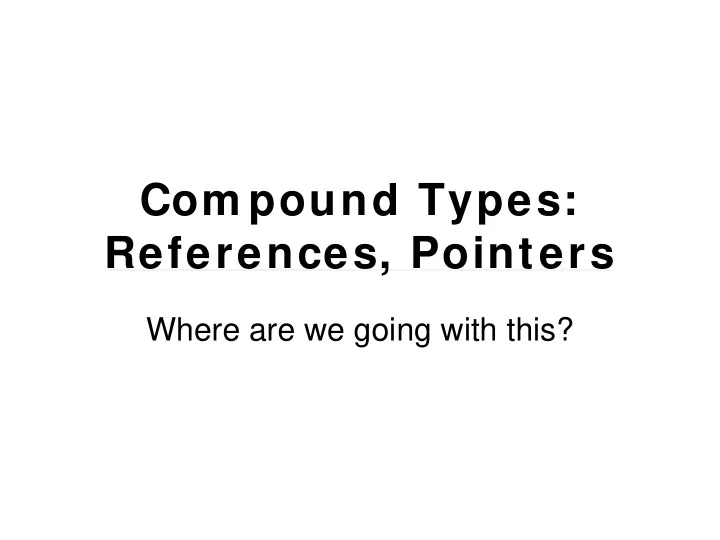

Com pound Types: References, Pointers Where are we going with this?
LHS and RHS • LHS = Left Hand Side − Means replace contents − Set value where this thing is stored • RHS = Right Hand Side – Means value – Evaluate expression, function, etc. – Arrive at a value to store in LHS
W hat is a Com pound Type? • A compound type is a type defined in terms of another type − There are several in C+ + − References and pointers included • Declaration = base type + list of declarators – Declarator = variable name and type related to base type
References • A reference is just allows you to use another name for an object − When defined, we bind the name to the object referenced − The reference MUST be initialized − The reference CAN NOT be changed int ival = 1024; int &refVal = ival; // good int &refVal2; // error!
References int ival = 1024; int &refVal = ival; // good int &refVal3 = refVal; // good refVal = 2; // now ival = 2 int j = refVal3; // now j = 2 also
References • A reference is an alias for an object − Anything you do to it, you do to the object it refers to • Type of reference and object must match exactly int &refVa4 = 1; // error, not object double dVal = 1.0; int &refVal5 = dVal; // error, types
Pointers • A pointer object is a compound type that holds the address (points) to another object − When defined, we do NOT have to initialize (though it is good practice) − A pointer may be reassigned − A pointer may have a pointer to it! • Pointer type must agree with object it points to − Otherwise, operations ambiguous
Pointers int j=5, *ip1 = &j; // ip1 pts to j int *ip2 = ip1; // ip2 also pts to j double f, *dp2 = &f; // dp2 pts to f double g = 0.0; dp2 = &g; // dp2 now points to g dp2 = ip2; // error! Type mismatch ip2 = &f; // error! Type mismatch
Symbol Table RAM Address 0xfa58 I dentifier Location 0xfa54 0xfa50 j 0xfa24 0xfa4c ip1 0xfa28 0xfa48 0xfa44 ip2 0xfa2c 0xfa40 0x00000000 0xfa3c 0x00000000 f 0xfa30 0x0000fa30 0xfa38 dp2 0xfa38 0x00000000 0xfa34 0x00000000 0xfa30 g 0xfa3c 0x0000fa24 0xfa2c 0x0000fa24 0xfa28 0x00000005 0xfa24 0xfa20 0xfa1c 0xfa18 0xfa14 0xfa10
Pointers • A pointer may be in one of 4 states: 1)Pointing to an object 2)Pointing to location just past an object 3)Null pointer (not pointing at any object) 4)Invalid (none of the above) • Dereferencing uses * operator int cnt = 0, *ip6 = &cnt; *ip6 += 5; // now cnt = 5 cout << *ip6; // prints cnt value
Pointers to Pointers • A pointer is an object • Unlike a reference, it may have a pointer to it • A pointer holds sufficient space for an address, NOT the object type it points to! • Defining a pointer DOES NOT allocate space for the object type at which it points! int cnt = 0; int *ip6 = &cnt; // ip6 pts at cnt int **ipp7 = &ip6; // ipp7 pts at ip6 int *ip8; // ip8 uninit’ed
Constants • const qualifier makes a variable unchangable • Makes it easy to know what literals mean • Makes it impossible to change the value • Value must be given at initialization const int MAXNUM = 100; MAXNUM = 200; // illegal! const int NAME_LEN = get_size(); const int K; // error! Uninitialized!
Recommend
More recommend